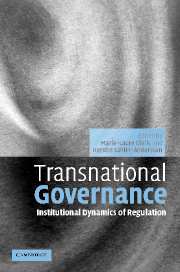Book contents
- Frontmatter
- Contents
- List of figures
- List of tables
- List of contributors
- Acknowledgments
- List of acronyms
- 1 Introduction: A world of governance: The rise of transnational regulation
- I Institutional forces
- 2 Scientization: Making a world safe for organizing
- 3 Marketization: From intellectual agenda to global policy-making
- 4 Organizing the world
- 5 The rationalization of virtue and virtuosity in world society
- 6 Soft regulation and global democracy
- II A dynamic transnational topography
- III Transnational governance in the making
- References
- Index
2 - Scientization: Making a world safe for organizing
Published online by Cambridge University Press: 22 September 2009
- Frontmatter
- Contents
- List of figures
- List of tables
- List of contributors
- Acknowledgments
- List of acronyms
- 1 Introduction: A world of governance: The rise of transnational regulation
- I Institutional forces
- 2 Scientization: Making a world safe for organizing
- 3 Marketization: From intellectual agenda to global policy-making
- 4 Organizing the world
- 5 The rationalization of virtue and virtuosity in world society
- 6 Soft regulation and global democracy
- II A dynamic transnational topography
- III Transnational governance in the making
- References
- Index
Summary
Introduction
In this chapter, we suggest that modern globalization, in the absence of other strong regulatory systems, has carried a worldwide wave of scientization. And authoritative scientization, in turn, created the foundation for an environment in which all sorts of social participants (from individuals to national states to corporations) can and must become organized social “actors.” Turbulence in the world comes under a sort of control through scientific rationalization, relying on a natural “sovereign” in the absence of strong legal or organizational ones. As a result of its expanding authority, scientization encourages the constitution of various social entities as organized, rule-making, and empowered actors. Uncertainties are transformed from mysteries into risks that must be managed (the European version; see Beck 1992) or into opportunities for more effective action (the American version; see Peters and Waterman 1982). In this environment, we see every new science or scientist or recognized scientific finding as tending to create incentives and requirements for forceful collective rule-making and for elaborated organization, both on a global scale.
Scientization disciplines and rationalizes the chaotic uncertainties of social environments, facilitating the creation of articulate rule systems, so that social actors can organize to deal with them. And given scientization, social actors must organize to manage the newly rationalized uncertainties in order to be or appear to be sensible and responsible. They must incorporate new technologies and create organizational routines to deal with the now supposedly manageable environment, in order to be properly accountable.
- Type
- Chapter
- Information
- Transnational GovernanceInstitutional Dynamics of Regulation, pp. 31 - 52Publisher: Cambridge University PressPrint publication year: 2006
- 37
- Cited by



